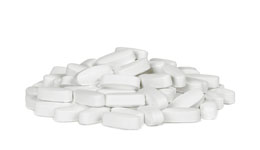Chondroitin Sulfate, when given as a dietary supplement, works wonders on patients who suffer from osteoarthritis. Read on to know more...

Chondroitin sulfate is a sulfated polymeric carbohydrate molecule. Biologically, it is defined as sulfated glycosaminoglycan (GAG). It is an essential structural component of our cartilage. It is a chain that can have over 100 individual sugars, each of them being sulfated in variable positions and quantities. It is a popular dietary supplement for people suffering from osteoarthritis.
Its Role in the Human Body
Chondroitin sulfate can interact with proteins present in extracellular matrix quite easily because of its negative charges. These types of interactions are vital for numerous cellular activities. Chondroitin sugar chains play a major role in stabilizing brain synapses. If the central nervous system of our body gets injured, the levels of chondroitin sulfate proteoglycans rise and prevent regeneration of damaged nerve endings.
Availability as a Dietary Supplement
Chondroitin is available in several natural forms. The extracts of cartilaginous tissues of pigs and cattle are mostly used to prepare chondroitin. Sometimes, cartilage of birds, sharks, and fish are also used for the same purpose. Thus, it is not a uniform substance, so the composition of the supplement varies from product to product.
Dosage
It can be administered orally. The permissible dosage of oral chondroitin is between 800 - 1200 mg per day. Usually, it is taken with glucosamine. So far, no major side effects of this supplement have been found. It is considered as one of the safest drugs for the treatment of osteoarthritis. It usually does not interfere with the effect of other accompanying drugs. Therefore, it's absolutely safe to take this supplement along with other drugs.
Effects on Osteoarthritis
Chondroitin sulfate is widely used as a dietary supplement for patients with osteoarthritis because of the simple belief that the real cause of arthritis is the local deficiency of natural chondroitin sulfate. Loss of this sulfate occurs due to erosion in cartilage. It acts as an anti-inflammatory substance and prevents inflammation of the joints.
It stimulates the synthesis of useful proteinaceous substances, proteglycans, and hyaluronic acid that gives support and anchorage to the cells of the cartilage. It also reduces the catabolic activity of chondrocytes and suppresses the synthesis of substances, like, nitric oxide that causes damage to the cartilage matrix. It acts as a carrier of water and nutrients into the cartilage and also allows other molecules to pass through it. This is an important function because cartilage does not have any blood supply.
Research has shown that chondroitin sulfate not only relieves the symptoms of arthritis but also slows down the progression of reverse process of osteoarthritis.


 Chondroitin sulfate is a sulfated polymeric carbohydrate molecule. Biologically, it is defined as sulfated glycosaminoglycan (GAG). It is an essential structural component of our cartilage. It is a chain that can have over 100 individual sugars, each of them being sulfated in variable positions and quantities. It is a popular dietary supplement for people suffering from osteoarthritis.
Chondroitin sulfate is a sulfated polymeric carbohydrate molecule. Biologically, it is defined as sulfated glycosaminoglycan (GAG). It is an essential structural component of our cartilage. It is a chain that can have over 100 individual sugars, each of them being sulfated in variable positions and quantities. It is a popular dietary supplement for people suffering from osteoarthritis.